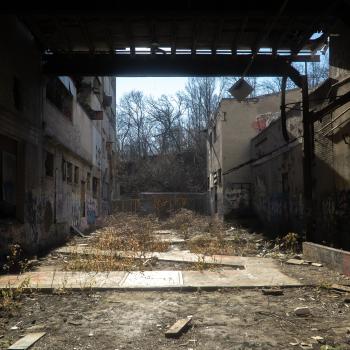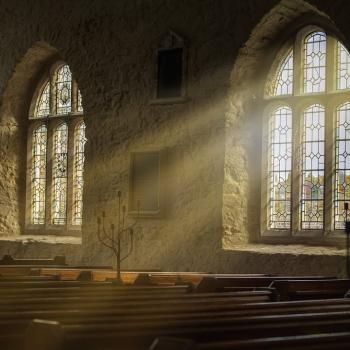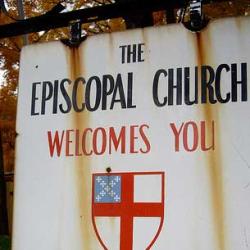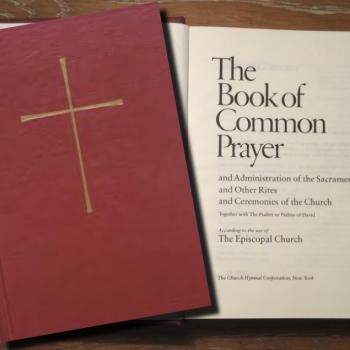I have been on The Episcopal Church’s Board of Examining Chaplains now for twelve years. I’ve finished my last batch of ordination examinations and as of General Convention next summer, I will have completed my responsibilities.
The examination has evolved over the last twelve years, as has the mechanism for evaluating it. I’ve been an observer and participant in the process. I’ve heard the debates around the character and value of the examination. I’ve participated in the attendant debates around the shape and efficacy of seminary education. I’ve also been a part of the “conversations about the conversation” about what the church needs by way of priests and deacons that has never taken place.
I wish that I was leaving the Board this year with a sense that we were somewhere on an upward trajectory, that we were building toward something as a church, that a vision for theological education was taking shape, that there was a fresh resolve to take seriously the task of clergy formation. Reading one to two hundred essay examinations a year, gives you a sense of how important that could be and how subtle and challenging that process is.
Candidly, though, and sadly, too, I don’t have that sense of things at all. I think that as a church we are tangled up in an anxious – even fearful spiral. A spiral that, paradoxically, has no center or focus – a spiral that in many ways we are unwilling to acknowledge, let alone discuss and address.
That isn’t the fault of anyone on the Board of Examining Chaplains. Without making excuses for the Board, we are trapped between the church and the seminaries. The process for examining candidates for the ordained ministry is prescribed by our church’s canons, but we are dependent upon the good will and support of the church and her seminaries. Like the identified problem in so many family systems, criticizing the General Ordination Examination has been our way of evading the real conversation as a church; and the Board is not placed to insist that change.
Having hoped we might have that conversation now for over a decade, I would be pleasantly – but completely surprised – if we ever do face the issues around seminary education and the nature of the best possible preparation for ordained clergy. I will be even more surprised, if we ever make a serious investment in it financially.
What I see taking hold, instead, is that fearful spiral, where the Darwinian battle among the survival of the fittest will yield a much smaller herd of both seminaries and priests. A simplistic reading of that principle is that what will emerge might be smaller in numbers, but virile, strong, and lively. What that picture of evolution doesn’t take into account are the things of beauty that die along the way, or the haphazard and sometimes weakened things that find their way to the other side.
In that world without a center and without a considered, prayerful discernment, there are random forces shaping the future that will exert subtle, but powerful influence:
One is economic: The level of clergy debt, the cash-poor state of our seminaries, and the changing demographics of the church will lead to the kind of scarcity that shrinks vision and narrows opportunity. Depending upon how you keep count, we have already lost two seminaries. We have two that are publicly troubled and there are others that live on the edge. According to The Episcopal Church’s presiding bishop, there are only two that can really do what needs to be done for their students financially – which is make it possible for them to attend, whatever their circumstances.
A second force is the confusion over kinds of theological education: There is no doubt that the whole of God’s church should have access theological education of some kind. It would be sweet relief if even a fraction of the people who attend church on Sundays in The Episcopal Church were actually exposed to the content of the Nicene Creed, apart from reciting it after the sermon. But to confuse or elide that need with the very different demand involved in training candidates for ordination is like confusing my varied interests in the practice of medicine with the training needed by my General Practitioner. Those needs ought to be de-coupled, even if seminaries did the work of educating the laity “on the side.” But pressure is being placed on the seminaries to merge the two and when they are merged the quality and depth of the education will be necessarily diluted, if for no other reason than the amount of time available to laywomen and men who might like to take a course or two. Seminaries are not Sunday Schools and they should not be made to function like them.
The third emerging priority is to press for theological education that accommodates endless life demands: Graduate students of any kind, typically do that work in tandem with the emerging demands of adult life. That is simply a given. What I discovered as a graduate student and what I am regularly reminded of as a professor, is that education does not – sadly – occur by osmosis. It is tough and demanding. It requires time and attention. Most graduate schools of every kind, including seminaries, are trying to find ways to accommodate those needs. But the hard truth of it is, that after all of those accommodations have been made, the student is still left with an inescapable choice: Am I prepared to make the sacrifices that are necessary to master this subject matter? Churches need to recognize this. Bishops should know this is the case. Denominations should be prepared to support that effort, particularly because they know how modestly most of those students will eventually be paid. And while there are always emerging systems for delivering an education that can and should be explored, the endless drum beat to “make it easier,” and “give it away faster,” does no one any good. Not the seminaries, not their students, not the church.
There are undoubtedly other forces at work beyond the three that I have named, but they are three of the most powerful forces at play in the church and her seminaries today. You can hear them in the halls. They echo through the occasional observations made by the church’s leaders. Those forces are exercising considerable influence over the shape of theological education in The Episcopal Church, but if you are a member of a mainline Protestant denomination, you cannot escape them.
Evolution is a blunt instrument and the theory is that we are on this side of that process because we can think. Perhaps we ought to think about this.












